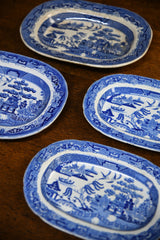Lifting the lid on why vintage kitchenware cooks up a storm in the modern kitchen.
As British Pie Week (March 7 – 12) steams ahead, we thought it would be a good excuse to head into the kitchen and sniff out some of the best buys in retro cookware and vintage kitchenalia.
Home is where the heart is
It’s often said that the kitchen is the heart of our home. It can be far more than just a place where food is prepared, cooked and served. It’s a meeting place and a storage area. It might also be home to a family pet. Children do their homework at the kitchen table, secrets are shared over cups of coffee and work-day challenges are eased with a glass of wine in this hospitable hub.
For many of us, the kitchen is where we first tried our hands at cutting out jam tarts, or sat licking out the bowl after making fairy cakes with a parent or grandparent. There’s a sense of warmth and comfort conjured up by a kitchen that gives it a sentimental value.
What better way to indulge those feelings than investing in retro pieces that will not only recapture precious memories but also add vintage charm to your home? And don’t forget that many of these items are often worth more these days than when they were created due to their superior craftsmanship.
The country house look, which has dominated UK design trends for some time now, is the ideal setting for vintage kitchenware. Most collectibles will sit happily in traditional kitchens and are equally at home in rustic and shabby chic interiors. The most lived-in kitchen will get an instant makeover with the addition of a couple of statement pieces.
Buying vintage accessories can also be a great way to add bang up-to-the-minute style to your home if you are on a budget as well as demonstrating your green credentials because buying antiques is all about recycling, re-using and avoiding landfill.
For inspiration, browse our website where you can find everything from vintage cutlery and retro stainless steel serving dishes, to Victorian jugs and antique cruet sets. You can also find some of the big names in china kitchenware, including Royal Doulton, Wedgwood, Meakin, Wallis Gimson and Aynsley.
In the meantime, we’ve cooked up a few ideas to make collecting antique kitchenware as easy as pie!
True blue beauty
Pretty Prattware pottery from the Victorian era is highly collectable with fans around the world - and it’s easy to see with these delectable antique meat paste jars in cerulean blue. These ceramics are part of a range named for Felix Pratt, a Staffordshire potter, who pioneered the process of underglaze colour printing on pottery to great effect.
These jars would make an attractive decorative addition to a kitchen dresser, or could be repurposed as unusual flower vases or even stationery storage.
Blue and white have been favourite colours in British kitchens for decades. These fresh tones remain a top choice for contemporary kitchens and we have a wide choice of vintage serving platters in both plain white and traditional blue and white willow pattern that can be mixed and matched to add a splash of colour and vintage elegance to modern meal times.
Dishing up history
To whistle up a truly antique feel in your kitchen, invest in a copper kettle such as this Victorian example with its elegant porcelain handle. For safety reasons due to its age, we would advise it is used for decoration only, although it could double-up as a quirky plant holder.
If you want your kitchen to measure up in the retro stakes, take a look at these antique Avery scales. Made of cast iron, they come with a porcelain plate and four weights. Modern copies are widely available but why settle for them when you can have the real thing?
Another piece of equipment that has been reinvented for modern cooks is the mincer or meat grinder. Now used mostly in commercial settings, the mincer was staple of British kitchens well into the 1970s. It was mostly used by canny cooks to turn the leftovers of a Sunday joint into tasty Monday pie and had, quite literally, universal appeal.

This wonderful example is an American Universal Food Chopper, manufactured by Landers, Frary and Clark in New Britain, Connecticut between 1897 and 1965. It was marketed as a device for processing vegetables as well as grinding meat. Made in cast iron, the number 1 on the device denotes the size of the grinder, with 3 being for the largest for heavy-duty use to 00 being the smallest. A number 2 used by the Kennedy family can be found in the John F Kennedy Museum.
It seems, therefore, that vintage kitchenware has graced the most elegant homes and that it’s still possible to find antique accoutrements to everyone’s taste!







